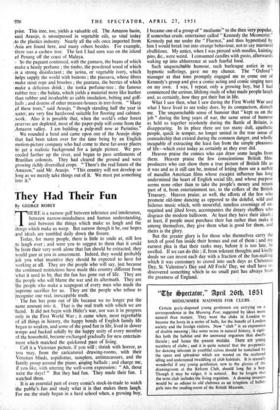They Had Their Fun
By GLORGE ROBEY
HERE is a narrow gulf between tolerance and intolerance, between narrow-mindedness and human understanding, and between the things which make us laugh and the .Things which make us weep. But narrow though it be, our hopes ,and ideals are tumbled daily down the fissure.
Today, for many people, there is little to smile at, still less ,to laugh over ; and were you to suggest to them that it could be from their very work alone that fun should be extracted, they would gaze at you in amazement. Indeed, they would probably ask you what incentive they should be expected to have for working at all. They are the people who will say, just because the continued restrictions have made this country different from .what it used to be, that the fun has gone out of life. They are • iiie people who will blame the war and its aftermath. They are 'the people who make a scapegoat of every man who made the 'gupreme sacrifice for us. They are the people who refuse to 'recognise one real, inescapable truth.
• The fun has gone out of life because we no longer put the same amount into it. That is the real truth with which we are faced. It did not begin with Hitler's war, nor was it in progress only in the First World War ; it came when, most regrettable of all things in history, the happy bonds of English family life began to weaken, and some of the good fun in life, lived in slower . trmpo and backed solidly by the happy unity of every member of the household, became exchanged gradually for new entertain- ment which matched the quickened pace of living. Call it a Victorian picture, if you will : shrink with horror, as you may, from the caricatured drawing-rooms, with their Venetian blinds, aspidistras, samplers. antimacassars, and the family group around the piano. singing ballads ; and charge me, if you. like, with uttering the well-worn expression: " Ah, those were the days! " But they had fun. They made their fun. I watched them.
It is an essential part of every comic's stock-in-trade to watch the public's fun and study what it is that makes them laugh. For me the study began in a hard school when, a growing boy, I became one of a group of " mediunis'" to the then very pop' War, if somewhat crude. entertainer called " Kennedy the Mesmerist."
Kennedy put me under the " Fluence," and thus hypnotised by him I would break out into strange behaviour, not to say maniacal ebullitions. My antics, when I was pierced with needles, knitting pins, &c., were weird. I consumed candles with gusto, afterwards waking up into abhorrence at such fearful food.
Such unquenchable humour, such burlesque antics in my hypnotic sufferings, gave me my chance. The " Oxford " manager at that time promptly engaged me to come out of Kennedy's group and give a comic acting and comic singing turn on my own. I was, I repeat, only a growing boy. but I had commenced the serious, lifelong study of what made people laugh and, as certainly, how they got their fun in life.
What I saw then, what I saw during the First World War and what I have lived to see today does, by its comparison, disturb me. The unquenchable sense of humour that " kept us on the job " during the long years of war, the same sense of humour as held us together resolutely during the Battle of Britain, is disappearing. In its place there are too many dull, apathetic people, quick in temper, no longer united in the true sense of comradeship that existed during the common danger. and wholly incapable of extracting the least fun from the simple pleasures of life—which exist today as certainly as they ever did.
Heaven praise the comics who can draw some laughs from them. Heaven praise the few conscientious British film- producers who can show them a true picture of British life as it was and as it still can be, instead of letting them see a surfeit of maudlin American films whose escapist influence has long undermined the heart of English social life, and whose purpose seems none other than to take the people's money and return part of it, from entertainment tax, to the coffers of the British Treasury. Heaven praise. as well, the efforts of the few who promote old-time dancing as opposed to the doleful, wild and hideous music which, with mournful, tuneless croonings of un- requited and jilted loves, accompanies the dreary shufflers who disgrace the modern ballroom. At least they have their ideals : at least, if people must purchase their fun rather than make it among themselves, they give them what is good for them, and theirs is the glory. But the greater glory is for those who themselves carry the torch of good fun inside their homes and out of them ; and my earnest plea is that their ranks may, before it is too late, be swelled. If we can do this ; if, from tolerant thoughts and kindly deeds we can invest each day with a fraction of the fun-making which it was customary to crowd into such days as Christmas Day, St. Valentine's Day and All Fools' Day, we shall have re- discovered something which in no small part has always been the greatness of England.


































 Previous page
Previous page